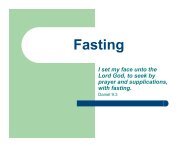Handout - Western Christadelphian Bible School
Handout - Western Christadelphian Bible School
Handout - Western Christadelphian Bible School
You also want an ePaper? Increase the reach of your titles
YUMPU automatically turns print PDFs into web optimized ePapers that Google loves.
3. Jewish days begin at sunset and end at sunset 24 hours later. The Jewish days shown<br />
on the calendar began 6 hours before the midnight that began the Gregorian day with<br />
which they have been associated. They also ended 6 hours before the end of the<br />
corresponding Gregorian day.<br />
4. Our calendar, including the duration of the months, is based on the Julian calendar -<br />
adopted by Julius Caesar in BC44. The original Julian calendar assumed that a year is<br />
365 days, 6 hours (ie 365.25 days) and made the correction for the extra quarter of a<br />
day per year by adding one day to February, every fourth year - leap year.<br />
5. However, the year actually has a mean duration of 365 days, 5 hours, 48 minutes and<br />
48 seconds. This is 11 minutes and 12 seconds less than that assumed by the Julian<br />
calendar. So the Julian calendar made each year a little longer than it should - if it<br />
were to accurately keep track, relative to the stars, with the earth’s orbit around the sun.<br />
By 1582 the error had accumulated to the extent of an extra 12.6 days (from BC44) so<br />
Pope Gregory decreed that October 5 th , 1582 should become the 15 th , thus eliminating<br />
10 days from 1582. Furthermore, to prevent the problem recurring, it was decided that<br />
century years (all of which were leap years under the Julian system) should only be<br />
leap years if they are divisible by 400. This means that 1600 and 2000 were leap years,<br />
while 1700, 1800 and 1900 were not.<br />
6. Britain only adopted the Gregorian calendar in 1752. In doing so, two changes were<br />
made to the Julian calendar used to that date. The first involved the elimination of 11<br />
days (the 10 days of Pope Gregory, plus the leap day of 1700 - required for the Julian<br />
calendar but disallowed by the Gregorian rules). The second change involved the<br />
moving of New Year’s Day from March to January 1 st . This means that although one<br />
year was shortened to 9 months, and excepting the 11-day correction mentioned above,<br />
the count of days and the duration of the months were not changed in any way. The<br />
British calendar then agreed with the Gregorian calendar.<br />
7. Jewish months have always begun at the new moon. Modern accounting is from the<br />
astronomical new moon; in ancient times, the new moon was declared when it was first<br />
visible, about a day after the astronomical new moon.<br />
8. We can track the new moons for any given year by counting lunations, realising that<br />
whole numbers of days are needed for the observation of the new moon.<br />
9. The modern Jewish New Year (beginning of Tisri, the 7 th month of the Sacred<br />
Calendar) is always found between September 6 and October 5. Some arrangement<br />
involving extra, thirteenth, months of the year must have been in place from the<br />
beginning, for 12 lunations are only 354.37 days and the year would rapidly get out of<br />
step with the seasons - which are determined by the 365.24-day solar year. Certainly,<br />
by the time of the fall of Jerusalem, we can confidently assert that the new moon of<br />
Tisri 1, AD70 would have been the new moon that was visible on or near September 23<br />
for that year. The calendar has been annotated with the corresponding Jewish months,<br />
the first day of which is the new moon that begins the month.<br />
10. The Jewish months shown on the calendar are numbered according to their position in<br />
the sacred year. The (commonly encountered) names of the months are (if a thirteenth<br />
month is needed it is called Ve-Adar):<br />
Page 37







